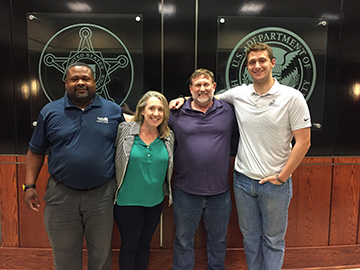
Samford University faculty members Greg Kawell and Cynthia Frownfelter-Lohrke, along with Romar Smith, manager of Brock School of Business technology services, and students Jeb Gebhart and Amelia Megginson recently were invited to participate in a cyber and operational resilience tabletop exercise sponsored by the Alabama Electronic Crimes Task Force and facilitated by the United States Secret Service.
More than 20 law enforcement agencies, private sector companies and Samford were invited to participate in these exercises. Samford was the only higher education institute to participate in the exercise.
“It’s very important as an institution we stay up-to-date on how to handle a real threat of our data being hacked,” said Frownfelter-Lohrke, professor of accounting. “These types of public-private sector exercises allow us to get the latest training on how to handle an attack if it were to happen. I was very grateful that the Alabama Electronics Crime Task Force and the Secret Service gave Samford the opportunity to participate.”
Every year, the number of sophisticated cyber attacks against public and private sectors in the U.S. increases. These cyber attacks continue to have an effect on business, government, and public and private entities across this country. When an attack occurs, they draw national attention to the importance of the issues of cyber security and incident response. These exercises allow public and private sectors to cooperate with each other and to discuss remedies.
According to the federal government, all sectors of critical infrastructure and business have been victims of malicious cyber activity. The government and private industries that collect personally identifiable information (PII), personal health information (PHI) and/or electronic payments, are specifically at a higher risk. Often, the purpose of many cyber attacks is to compromise PII or financial data to steal money from their victims. There has been no shortage of reported successful data breaches in recent years that have compromised millions of people’s PII, PHI and/or payment information.
The methods in which these data breaches are carried out continue to evolve. Spear phishing, social engineering and traditional hacking remain constant threats. However, the emergence of custom engineered and polymorphic malware is making detection increasingly difficult through traditional methods. In short, regardless of the strength of a network’s security, anyone who connects to the internet is susceptible to experiencing a cyber attack.
Gebhart, a senior finance major and computer science minor, said, “I have always been interested in working in information security, so when the opportunity arose for a couple of students to participate and spend four hours learning from the Secret Service and interacting with information security professionals, I jumped at the chance. Amelia and I were the only students who got to participate in the exercises with professionals from these big corporations and organizations. I even got to add to discussions based on what I have learned at Samford.”
Kara Kennedy is director of marketing and communication for Brock School of Business.
